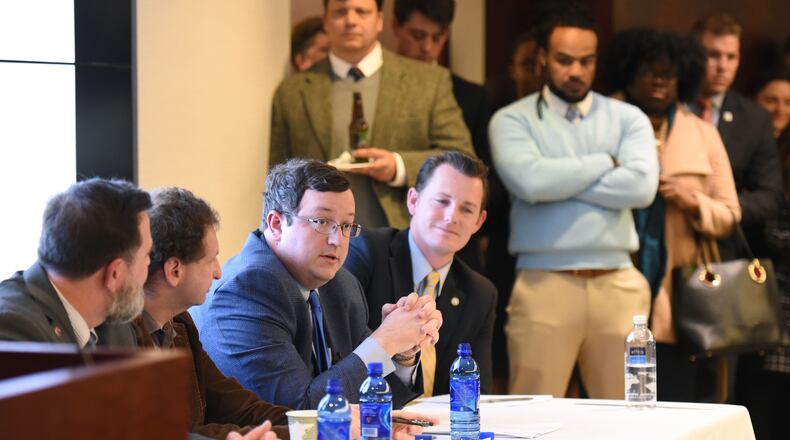This year's fight over the "religious liberty" bill is shaping up to revolve around the same debate it did last year: the fate of an anti-discrimination amendment tacked onto the measure.
State Sen. Josh McKoon, the measure's sponsor, and many of its conservative supporters insist that adding such language would negate the effect of a bill meant to protect the faith-based activities of people of any religion. They have the overwhelming endorsement of rank-and-file Republican activists at their side.
The battle lines have been drawn. Three powerful Republican lawmakers say it must have anti-discrimination protections. Gay rights groups and clergy members have loudly proclaimed the need for the addition. And, as our AJC colleagues Aaron Gould Sheinin and Kristina Torres reported, a new coalition of powerful corporate firms has emerged to fight the bill over fears it would make the state an economic pariah.
That came to a head on Wednesday evening when McKoon was on the hot seat at a panel hosted by the Georgia chapter of the American Constitution Society to discuss the merits of his proposal. Flanked on either side by two ardent critics of his measure – Georgia Equality head Jeff Graham and Democratic state Rep. Taylor Bennett – he cast the plan as a new line of defense for the religious.
Sitting next to him was
, an Emory University law professor with conservative credentials. He said he wouldn't vote for the Georgia version of the statute but contended that fears over the bill’s unintended consequences were overblown.
"I don't think we've seen the sky fall for all the decades we've seen RFRA," he said of the debate over the federal law, first passed in 1993, known as the Religious Freedom Restoration Act.
“Of course, everybody who can think up, can dream up a religious exemption will try to push that in the courts,” he added. “And almost always, they will lose. And particularly for discrimination cases.”
So what of the anti-discrimination clause this year?
McKoon, the Columbus Republican, said he considered another effort to add the language a non-starter. Such an attempt last year ended up scuttling the bill, but this year McKoon could have election-year politics working in his favor. He argued that inserting the amendment would allow local governments to opt-out of the measure and render it "meaningless."
“The entire purpose of the bill is to create a uniform standard,” McKoon said. “If you say, now, that a local school district or city council or county commission decides they don’t want RFRA in their community and they pass an ordinance to opt out, you have a spider web of religious freedom standards around the state. It would undermine the purpose of the bill.”
Volokh, offering instant analysis after hearing the text of the amendment read aloud at the forum, said he doesn't see it necessary because similar anti-discrimination language was lodged elsewhere in the bill.
“It’s really hard for me to see the difference," Volokh said. "But politically on the ground, I don’t know what’s going on there.”
That's when Graham cut in, saying that optics is just as important as the legal machinery of the bill. Dozens of attorneys vetted the proposed amendment, he said, and they came up with the wording for a reason.
"They were the ones who said it could be used to legitimize and incite people to discriminate," he said. "That folks could feel they could use it to discriminate. And whether or not they will prevail in court – that’s important. But I’m more concerned about what happens in peoples’ day-to-day lives.”
Read more:
Georgia's fight over 'religious liberty' comes out of the closet
Georgia businesses are gearing up for next 'religious liberty' fight
About the Author
The Latest
Featured




